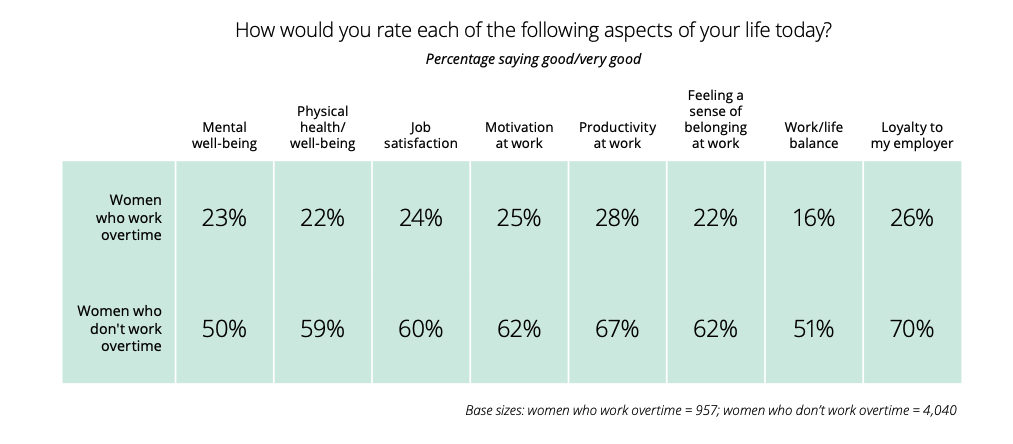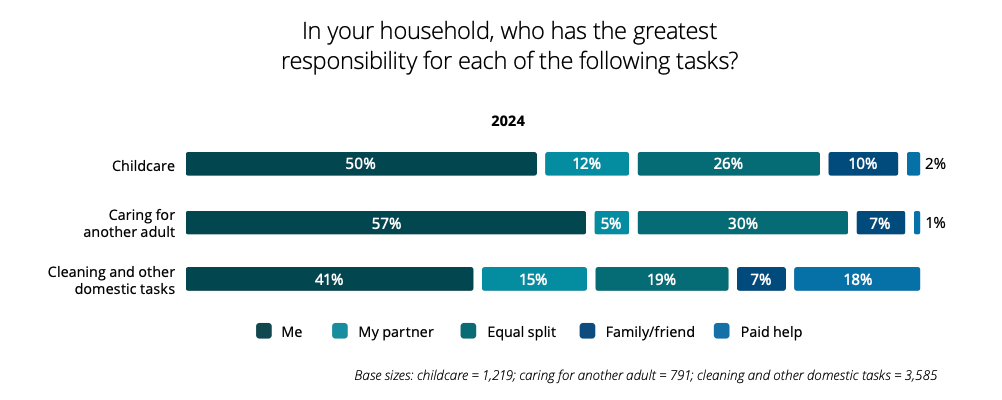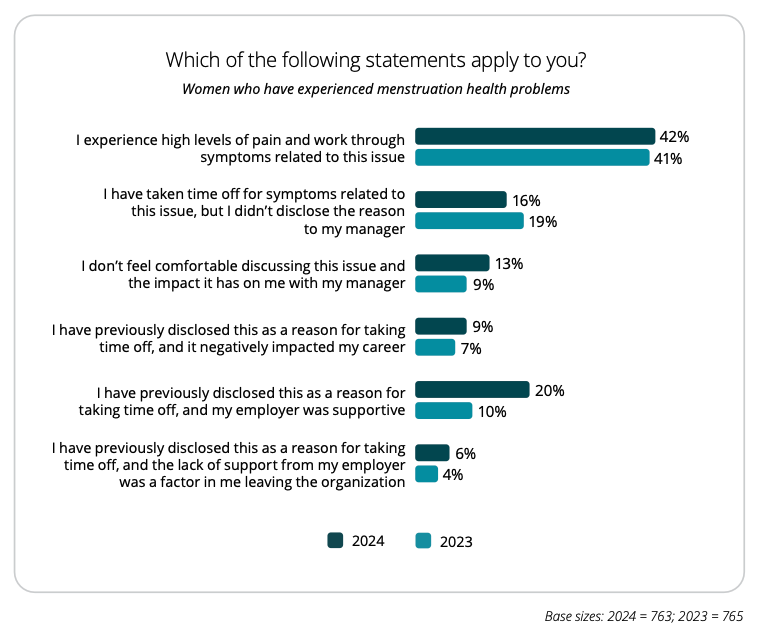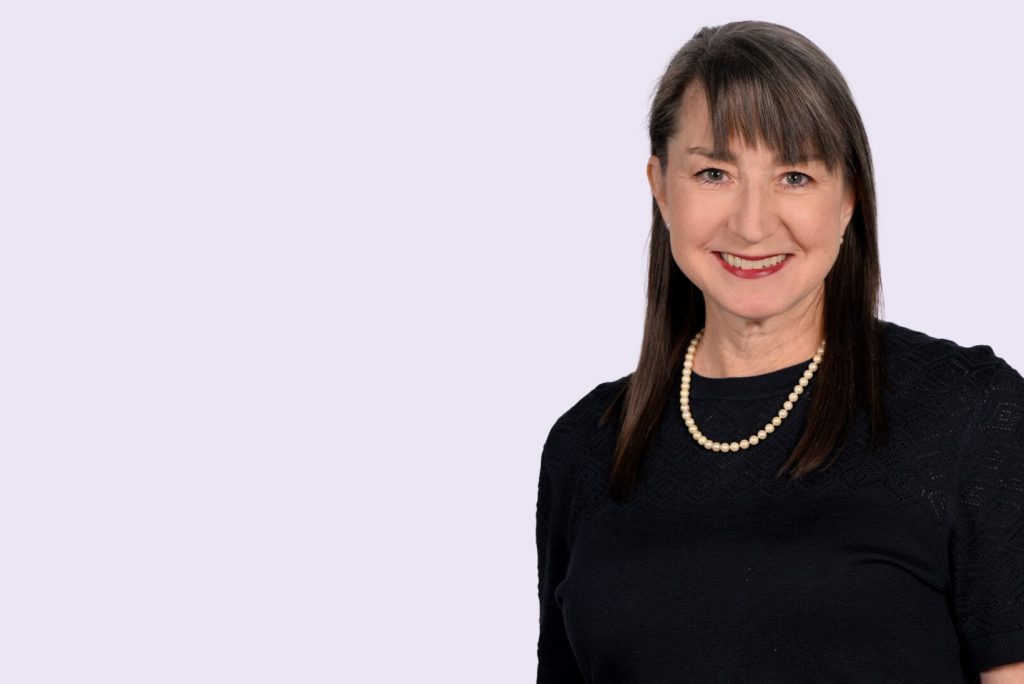May 28, 2024
When asked to outline the state of women at work, Emma Codd offered a damning assessment – a cause for concern across the workplace, personal lives and in communities.
The headline is troubling enough, that women are “facing mounting pressures”. But underneath the surface, a much bleaker picture emerges.
According to Women @ Work: A Global Outlook – an annual Deloitte survey of 5,000 women in workplaces across 10 countries – such pressures span mental and physical health.
“Globally, women feel their rights are backsliding, they are experiencing increased stress and taking on the majority of household tasks at home,” said Codd, speaking as Global Chief Diversity, Equity and Inclusion (DE&I) Officer at Deloitte.
“Alongside this they are experiencing non-inclusive behaviours at work, are concerned for their safety and feel unable to disclose when they are experiencing women’s health challenges. This is a situation that must change – and employers must enable this.”

In 2024, significant challenges facing women include:
The report – which launched in 2021 – was commissioned to highlight some of the most pressing issues impacting women’s experiences in the workplace, and their careers.
Findings in 2021 and 2022 largely reflected the impact of COVID-19 on the lives of working women – and the move to hybrid working for many – as well as experiences of exclusion, non-inclusive behaviours and burnout.
Meanwhile, 2023 saw a downward shift in these experiences but they remained prevalent for many women, alongside challenges relating to work/life balance, women’s health and domestic responsibilities, among other things.
“This year we see these themes continue and, in some cases, worsen,” Codd added.
Stress and long working hours take an increased toll
According to Deloitte, half of women report stress levels to be higher than they were a year ago with a similar segment “concerned” or “very concerned” about their mental health. Mental health is a top three concern for women globally (48%), falling behind only their financial security (51%) and rights (50%).
“There are a number of potential factors behind declining mental health levels, but among them is an inability to disconnect from work,” the report stated.
As outlined via Deloitte, a strong link exists between working hours and mental health. While half of women who typically just work their contracted hours describe their mental health as “good”, this declines to 23% for those who regularly work extra hours. Only 37% of women say they feel able to switch off from their work.

Despite this, more than half of women aren’t receiving adequate mental health support from employers, and two-thirds of women don’t feel comfortable talking about their mental health in the workplace.
“Though this highlights a need for significant improvement, it does show progress from last year’s findings when even more women said they did not receive adequate mental health support from their employer and did not feel comfortable speaking about mental health in the workplace,” the report explained.
Women bear the most responsibility for household responsibilities
Delving deeper, women are also feeling the weight of misbalanced caregiving and domestic responsibilities.
Notably, 50% of women who live with a partner and have children say they take the most responsibility for childcare – up from 46% in 2023, with only 12% saying this falls to their partner.
Further, 57% of women who live with a partner and are involved in care of another adult say they take the greatest responsibility for this – up from 44% in 2023, while only 5% say this responsibility falls to their partner. Meanwhile, more than two in five women bear the most responsibility for cleaning and other domestic tasks, similar to 2023.
These pressures are taking a toll: women who take on the greatest share of household responsibilities are far less likely to say they have good mental health than those who do not. And nearly half say they have taken time off work for mental health reasons in the past year, compared with just under a quarter of women who don’t have the greatest responsibilities for these tasks.

The result of this disproportionate allocation of responsibilities makes it more challenging for women professionally – only 27% of women who bear the greatest responsibility at home say they can disconnect from their personal life and focus on their careers.
Women feel unsafe in the workplace and non-inclusive behaviours persist
According to Deloitte, nearly half of women are worried about their safety when they are at work or traveling to or for work.
These concerns may be founded on experience: one in 10 of these women have been harassed while commuting or traveling for work, 16% deal with customers or clients that have harassed them or behaved in a way that has made them feel uncomfortable. Nearly one in 10 have been harassed by a colleague.
Overall, 31% of respondents have experienced micro-aggressions, 4% have experienced sexual harassment and 8% have experienced other types of harassment at work in the past 12 months. Further, a quarter of women say that people in senior positions within their organisations have made inappropriate actions or comments toward them.
Women who identify as part of an underrepresented group are more likely to be worried about their personal safety at work or when traveling to or for it. This concern is more pronounced for women with a visible disability (66%) and transgender women (64%).

Underrepresented groups are also more likely to experience non-inclusive behaviours. For instance, 40% of women belonging to an ethnic minority in their home country and 45% of women with a disability have experienced micro-aggressions at work, compared to 30% of women who are not from these groups.
More than half of LGBT+ women have experienced micro-aggressions, compared to less than three in 10 women who are not LGBT+.
Women are working through pain
More than one-quarter of women experience health challenges related to menstruation, menopause or fertility. And across each of these challenges, a common theme remains true: many are working through pain or discomfort.
For example, around 40% of women experiencing high levels of pain or discomfort from menopause work through their symptoms, almost double the percentage who said the same in 2023.
More women say they don’t feel comfortable discussing their menopause symptoms with their manager (14%) compared to last year (10%), perhaps because 16% of women say citing menopause as a reason for taking time off work has negatively affected their career – a sharp jump from 6% in 2023.
Nearly one in six (15%) of women experiencing challenges relating to menstruation, menopause or fertility feel that speaking up about this at work would affect their career progression. Notably, one in 10 believe doing so would make them vulnerable to redundancy.

Flexibility and work/life balance are key to retaining women
This year has seen a sizeable improvement in women’s experiences with hybrid working – including when it comes to exclusion, predictability and flexibility. However, about three in 10 women still experience exclusion from meetings, a lack of predictability in their working pattern and a lack of flexibility.
According to Deloitte, more than 40% of women report that their employer has recently implemented a mandatory return to office. Of these women, a quarter are required to be on-site full time.
Some of these women report that they have made adjustments to their work and personal lives following the introduction of such a policy – and some highlight an impact to their mental health and their productivity levels:
The impact of challenges with flexible working is also evident. Lack of flexible working hours is among the top reasons women have changed jobs over the past year (15%), with the same number also citing poor work/life balance.
Despite this importance, fewer than half of women feel supported by their employer to balance their work responsibilities with commitments outside work.
Nearly all women (95%) believe that requesting or taking advantage of flexible work opportunities will negatively affect their chances of promotion and 93% don’t expect that their workload would be adjusted if they moved to a flexible working arrangement.

Gender Equality Leaders are excelling, but more are needed
Overall, company culture seems to be standing in the way of women’s retention and career progression. This year, the survey found that one-quarter of women do not want to progress into a senior leadership position in their organisation, with the top reason being that they’re put off by the company culture.
At organisations known as “Gender Equality Leaders”, however, 92% of women do want to progress into a senior leadership position. These organisations benefit from building inclusive cultures where work/life balance is valued and respected and where women feel supported in their career progression.
Women in these companies report higher levels of loyalty toward their employer and productivity, feel safer, are more comfortable talking about their mental health at work and are more comfortable they can work flexibly without it damaging their career.
“It is widely understood that more diverse organisations perform better, yet most organisations in our study are not making visible progress on their commitments to gender equality,” observed Elizabeth Faber, Global Chief People and Purpose Officer at Deloitte.
“To create inclusive cultures that enable women’s success at work, organisations should focus on addressing workplace factors that drive stress, reduce stigma and create a culture where women feel able to disclose challenges with their mental and physical health, support efforts to balance work responsibilities with commitments outside of work, and enact policies that empower women’s career progression.”
Inform your opinion with executive guidance, in-depth analysis and business commentary.